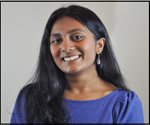Palak Shah

Palak is a second-year medical student at Boston University Chobanian and Avedisian School of Medicine. She studied Molecular Biology at Harvard College, where her research in HIV established her interest in infectious diseases and global health. After college, she worked as a research assistant developing and evaluating point-of-care diagnostic tests for bacterial STIs. In medical school, she has focused on improving the health of Boston's refugee population through her volunteer work with the Refugee Women's Health Clinic at Boston Medical Center and as a leader of the Global Health Equity Program, partnering with refugee resettlement organizations to organize health screening and education programs. For her Kean project, Palak will be working with a team of tuberculosis researchers in Puducherry, India to evaluate the acceptability and feasibility of community-based HIV and TB screening among persons who are malnourished.

Systematically Looking for Infections in the Malnourished (SLIM)
Jawaharlal Institute of Postgraduate Medical Education and Research (JIPMER)
India
What does the Kean Fellowship mean to you?
I am honored to be selected as a Kean Fellow. The Kean Fellowship provides me with the opportunity to explore tropical medicine, understand the physical and social factors impacting the efficacy of a proposed intervention, and gain experiences that will underpin my career in medicine and research. I am excited to continue learning from my mentors in the US and India, as well as from the ASTMH and Kean Fellowship communities.
What do you anticipate learning?
My research project will evaluate the acceptability and feasibility of community screening initiatives for HIV and TB in South India. To achieve this, I aim to enhance my quantitative research skills by learning biostatistical analysis and cost-effectiveness modeling. The Kean Fellowship will also allow me to extend my past experiences in the lab and clinic to appreciate the complexities of implementing a research project in a low-middle income country. In working with an interdisciplinary team of clinicians, social workers, nutritionists and researchers, I will gain multiple lenses with which to understand barriers to care as well as opportunities to build partnerships with communities. In addition, I look forward to witnessing the practice of medicine in an international setting and improve my knowledge of factors driving TB morbidity and mortality in different populations.
What interests you about tropical medicine and what problems are you interested in solving?
I am drawn to tropical medicine due to its focus on alleviating inequities, strengthening healthcare systems, and applying interdisciplinary approaches to address the social and biological determinants of disease. I am especially passionate about identifying and tackling barriers to diagnosis and epidemiologic surveillance of infectious diseases. The unmet need is two-fold: increasing the availability of rapid, accurate and affordable diagnostic tests and designing implementation strategies to deliver these tools to affected populations. I aim to work closely with colleagues and communities to develop sustainable solutions that foster resilience and alleviate the burden of tropical diseases.
Moreover, my experience in India showed me how climate change has already impacted the health of vulnerable communities and created conditions which foster the emergence and spread of infectious diseases. I am interested in exploring the effects of climate change on the epidemiology of infections like TB as well as in investigating strategies to improve pandemic preparedness. Tropical medicine research can provide valuable data to guide policy-making, and I find this intersection incredibly exciting.